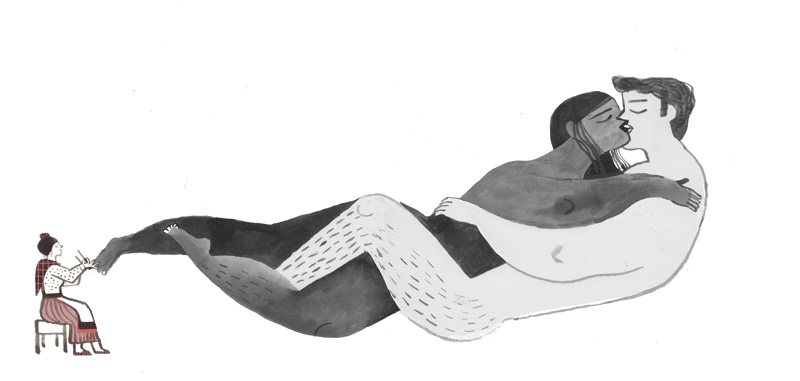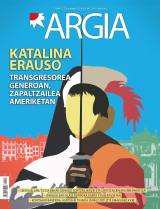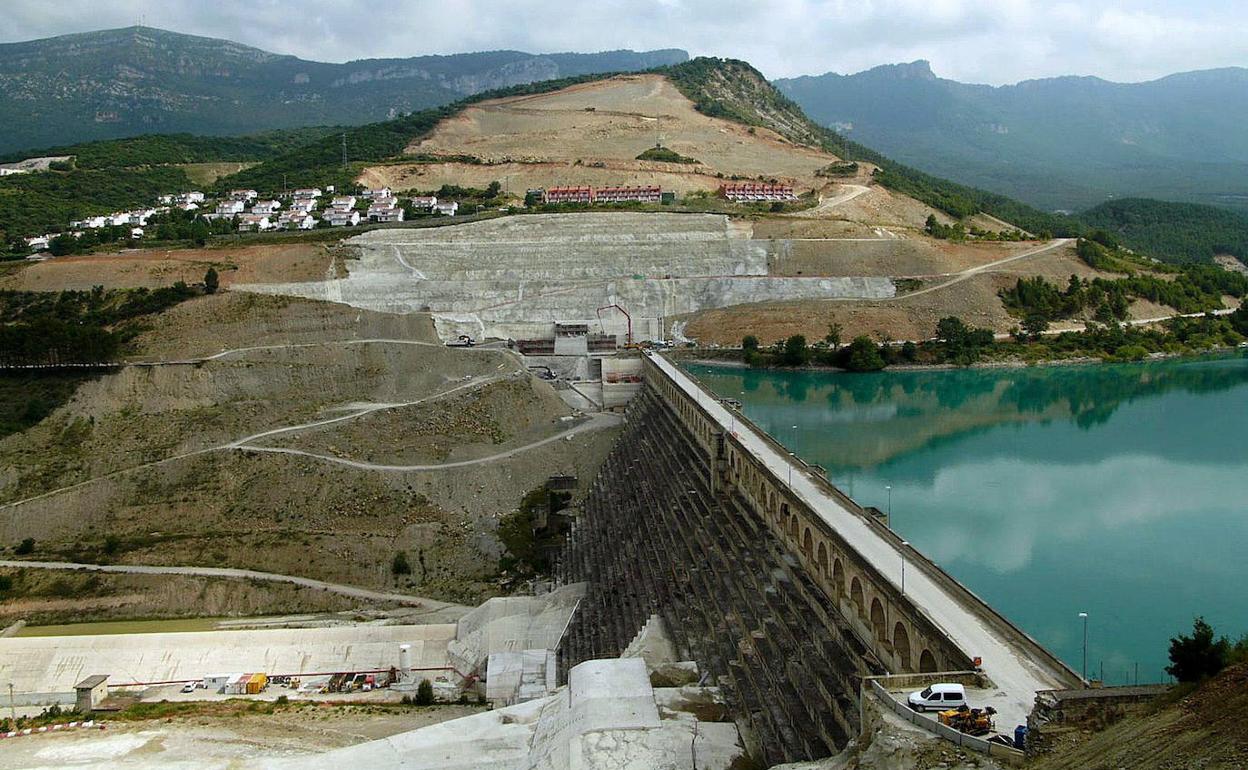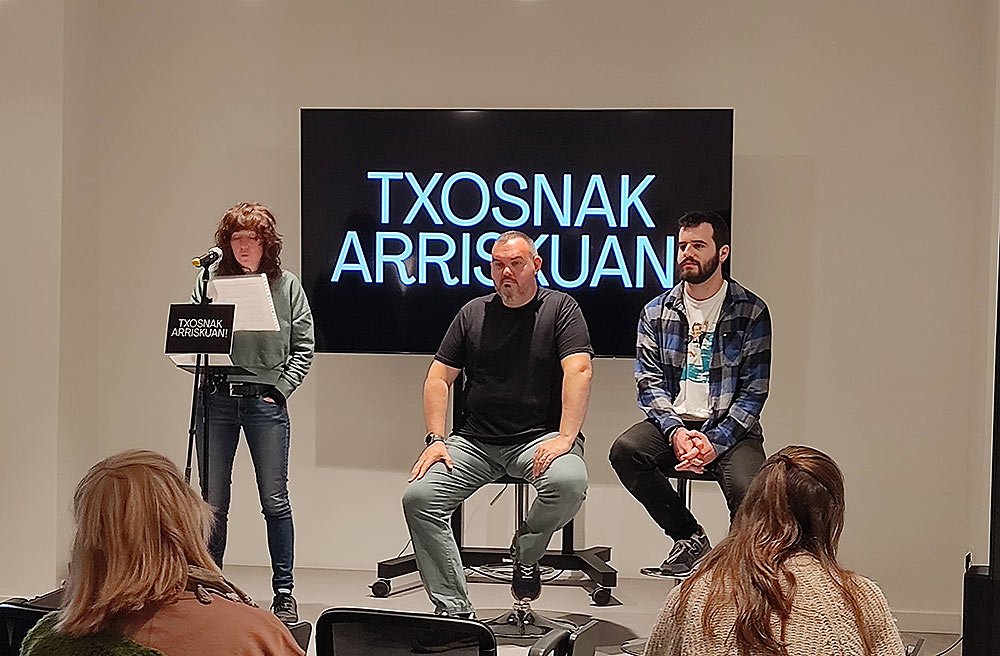Time Irules
- We are going to go in the shadow of a trade or profession that until recently was visible and effective, in the line of the song I am doing in Irut. In the Igartubeiti Museum Caserío, for example, we can see all the steps and machines from the production of flax to the fabric row. Songs that have as their theme spinning, embroidering or sewing are drowned with nostalgia and melancholy.

In the Basque Country, as in many places, the textile industry was a very important sector of the economy. Some songs clearly highlight the situation: there are the variants of the beautiful in Irut, the Kilo Egilea de Otxalde and the Daughter Merchant of Intxauspe or Maria de Alegia of 1885 by Agustín Etxeberri...
They tell us about the work in a realistic way. The axes and looms are configured and the romantic women spin, embroider, bastards, cosen. The Basque language has a rich vocabulary to describe the trade. In the wonderful Oi Pello Pello, let's say, the voyages of the trade are determined: spinning, astalka, harilka, jos, jos... In all verses the kilo appears, hung from the waist of a girl in the hand. The stems of wood or wicker gathered yarn of flax, of work or of hemp that were not yarn. When uttering the word quilo, the distant echo of the Germana knülle original word is heard.
I'm spinning the version of the poem by adding to the melancholy of the denied love signs of class struggle
From the Mesopotamian tradition to the present day, the textile industry has been the work of women. Men never used the kilo, and if they used it, it meant that they had slipped into humiliation by the stirrups of society. When industry devoured the textile industry, paternalistic bosses had proletarianised women. The same women become stars in the images of Louise-Michel or Merci Patron, who suffer from the crisis of this kind of industry...
I'm spinning, with the
weight of my
load
at my waist, crying ...
I am singing in Irut by the search engines of ancient songs that took root in the areas of Baja Navarra. It's a conversation of three really naked and deep cocks. The pain of denied love appears in each line. The irule that has in the eye the crying speaks with the person that loves:
You're crying, sighs ...
A consolation horse,
yes, over time.
The member of the evil Irule knows that time heals the wounds and feels with great lightness and with the silent irony of the experience.
People say
"hal'eztena frango,"
"My beloved
child for you and me."
When the quilt is rounded at the waist, when gestures are repetitive, there is time to reflect. The woman of the song holds her love against the petty-minded and incomprehensible of society, as happens in the hearts of burnt lovers on many occasions.
The verses of the Kilo Author of Otxalde 1878 show that the world of the spinners and of the producers of fabric disappeared as early as the middle of the 19th century. (...) Bertsolari, denying the new economic conditions, takes root the gravity of the situation in the laziness of drunk girls
Intxauspe's merchant daughter is crying at her work, consoling apprentice. He has come to the vestibule of a neighbor in the early morning of Saturday where he has worked as a dresser or a clothing arranger. Ana was coming to our house, and the elderly were talking in a low voice about the ugly things that were happening in the villages. In a low voice and in French so that children – we, however – do not understand them.
The merchant daughter of
Intxauspe, who has been
sewn early in the morning, passes the morning from apprentice to...
This series of cocks is also a conversation between the apprentice and the experienced merchant. The apprentice seems to make more sense than Intxauspe's daughter, who points to the path of prudence:
You love what you're not going
to be, he saddens me.
She loves what you can
have if she has a garden reputation...
In these forceful paragraphs we realize the importance of the terrible social pressure that the collective cultivated (or has) in the simple Basque, as long as it is well known, the cunning merchant informs him that he can love anyone. What, then, is fame? Worker, believer, Euskaldun, honored dantzari, expert pelotari, humble lady at home and above all, who would like to laugh.
The version of the poem Iruten ari nok, which was released in the Baigorri Valley, added signs of class struggle to the melancholy of denied love. A sparkling lover says strongly that he will not caress a gentleman, a tenant, but a bystander and a bystander.
Spinning makes me
tickle at the
waistline
and weeping in the eyes.
Outside my window, if
you're a
gentleman, I'll turn the
candle on for the passerby.
I defend my servant
with my
affection the dishes
of the tenant don't give me up.
The verses of the Kilo Author of Otxalde 1878 show that the world of the spinners and of the producers of fabric disappeared as early as the middle of the 19th century. It wasn't quite productive.
The kilogram manufacturer Gilen of
Amikuzeko has evicted his employees from their homes:
Dear servers!
Well, the means of profit you've lost.
As you know, the activity began to be industrialised and automated in England, in the Jacquard workshops in Lyon in France and then throughout Europe. Today they come from China, India or Turkey. In Europe they spin and sew the luxurious suits that are only sold at high prices. Bertsolari, denying the new economic conditions, took root in the laziness of the girls drunk the gravity of the situation:
Homer created Penelope's Turbid character, which became the symbol of the hilarity of time. Also, the one who works with the thread lifts in us the dust of Sisisyphus impeded and unloved...
It can't cost a hundred pounds of
spindle, because the sock needle,
the purple wire, has expired!Don't
be frightened, girl.
Elhe takes the skirt in his hand, which in the
working memory does not have in his
head, like a sloth!
In the corner of the box is a handful of white clothes.
Society changed radically, and it got into speed with the roll-out of rail networks. The sellers went from home to home through the markets and towns presenting fabrics to fashion. The work was abandoned and the pounds and looms were taken to the museums.
There are a few young irules in Eskual
Herria, you don't see the kilo at
the waist, at
the door, oh, what pants at the sales fair.
Otxalde may be glad that the harnesses used for spinning can be admired today in the acts of Hazparne (Baigorri). There are still few men who know the techniques of this trade, who have a good exercise of skill with their fingers and great prudence.
Why do we get so much grief at the heart of the spinners? The answer takes us to the limit of literature and poetry, the rocky island of Ithaka, sculpted for the goats, and the centuries in which the gods were told in verse the indignations of the gods. We imagined Penelope of Odyssey spinning a blanket, sewing, sufficing during the day, and at night, destroying the meticulous task so that the place of Ulysses was not stolen by a hand granite. The cloudy character created by Homero became the symbol of the hilarity of time. Also, the one who works with the thread lifts in us the dust of Sisisyphus impeded and unloved...
Penelope, perhaps, during the twenty years that Ulysses was out, was able to shed some tears like the iruleons of the Basque Country. But he knew that an essential tissue was being created that was being used at birth to betray the children for the first time and to protect and surround the bodies that are going to be buried on the ground. Palpating the canvas, we can see that we have something beyond the ordinary, a part of humanity that goes beyond the limits of our mere condition of people.
The song was recorded by Kepa Junkera on a record of recent years with the voice of Miguel Bosé or Benat Axiari and Nemesio Etxaniz (1899-1982) offered a tragic theater in 1952 to risk the Guipuzkoan public by recycling the atmosphere and the tracks of the song.
The irule, despite being lost, as soon as it closes its eyes, unites the worlds of mythology within our grasp and then, to it, completes the relationship that we thought was canceled.
BRN + Neighborhood and Sain Mountain + Odei + Monsieur le crepe and Muxker
What: The harvest party.
When: May 2nd.
In which: In the Bilborock Room.
---------------------------------------------------------
The seeds sown need water, light and time to germinate. Nature has... [+]























